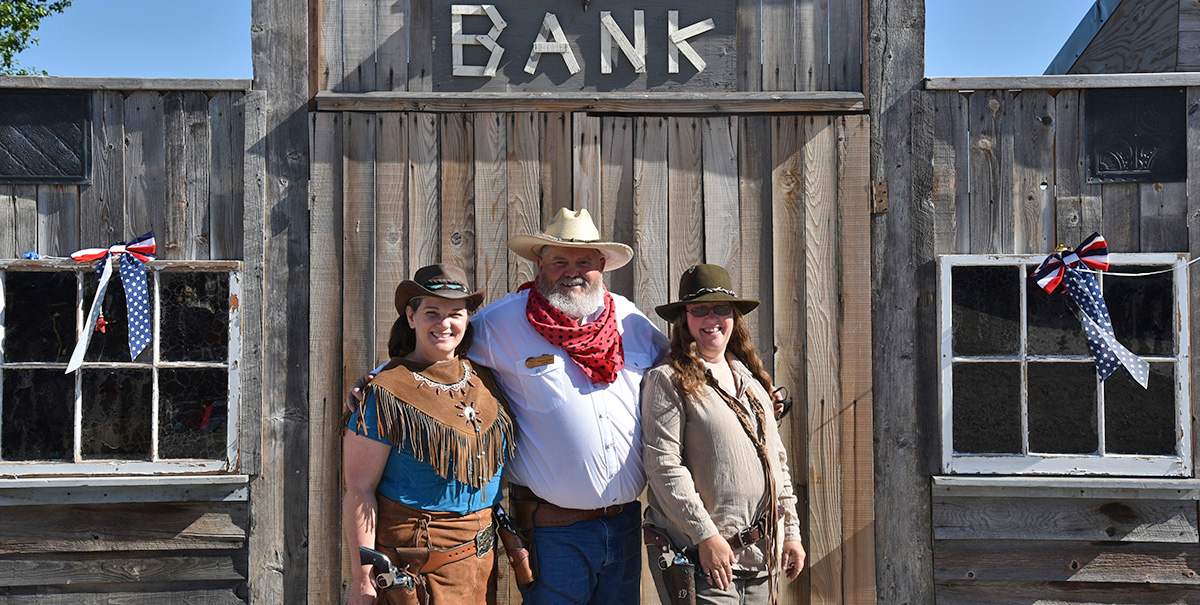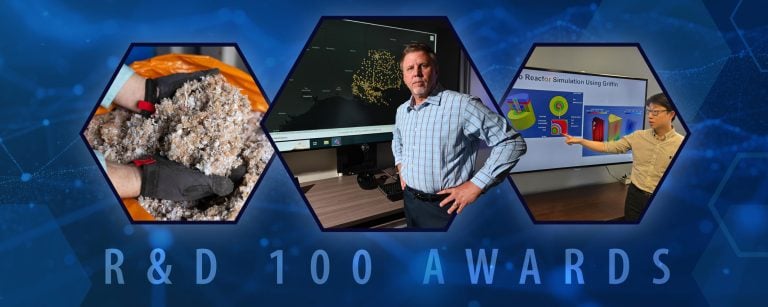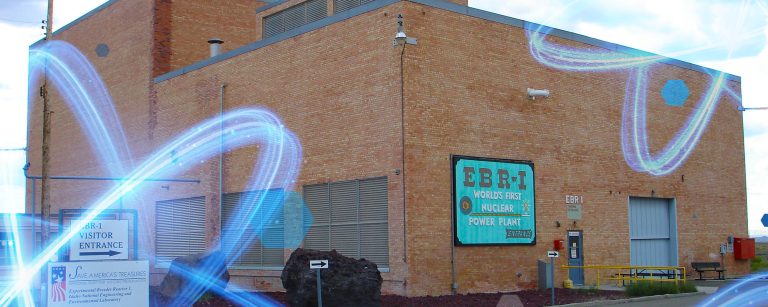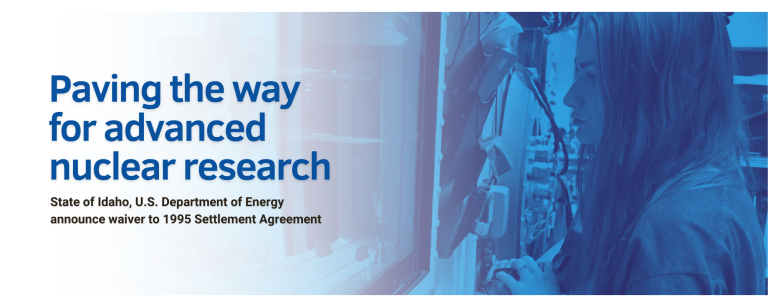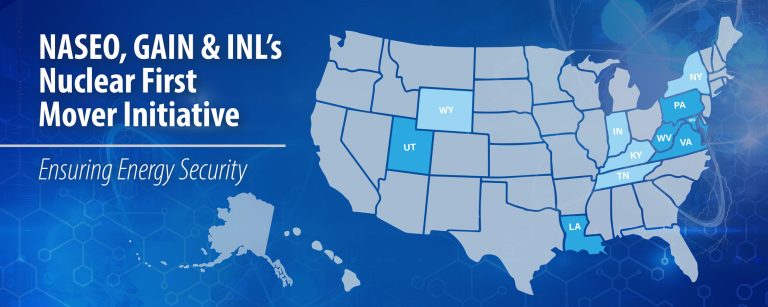With a Ruger .45 caliber revolver glued to her hip like a fifth limb, Debbie Sioux stands at the firing line ready to draw. Her trigger hand circles her gun like a hunter surrounds its prey — skulking and calculating its every move.
But her quarry isn’t a rabbit or deer. It’s the mantle of the Eagle Rock Outlaws’ fastest gun.
“Shooters on the line. Shooters… SET!” echoes the PA announcer. A harsh sun beats down on Sioux’s hat and specks of dust kick through the wind, but despite the distractions, she’s relaxed and composed – the only thing gunslingers can be when preparing to draw their six shooters.
She waits… and waits… and waits.
After standing patiently adorned in a hide poncho for what feels like an hour, Sioux’s revolver speeds out of her holster like a racehorse. She pulls the trigger, and with a record time of 0.465 seconds, Debbie Walker hits her target and wins the round.
When they’re not helping lead the nation’s nuclear research and development, some Idaho National Laboratory employees are venturing into the Old West to participate in the Eagle Rock Outlaws’ quick draw competitions. July 20 saw over 60 gunslingers entering the Outlaws’ hideout during the 9th Annual Grand Teton Gunfights.
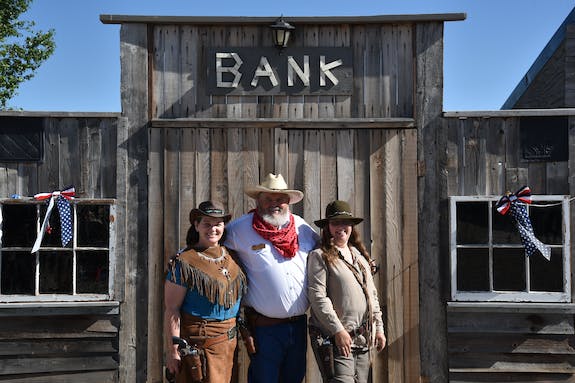
The two-day tournament sees competitors from across the region coming to compete for the club’s title of the fastest gun in the spirit of keeping the Wild West alive. Shooters of all ages participate in the fun, with contenders ranging in age from 9 to 80 competing in the men, women and youth categories.
Every contest transpires with six competitors stepping up to the firing line and standing face-to-face with a pressure-activated targeting system to compete with another shooter. Each participant stands 21 feet away from their target with a hand judge directly behind them to ensure there are no premature draws and to verify the safety of those competing. The sport itself is an homage to duels often depicted in Western films. The difference in this competition is that shooters fire at silver targets and not each other.
A Range Master gestures for shooters to ready themselves, and after a brief pause, the targets illuminate orange, signaling for the competitors to fire. Results are quickly communicated using a digital timer to measure the firing time of each shooter in the thousandths of a second, anything more specific is considered a tie.
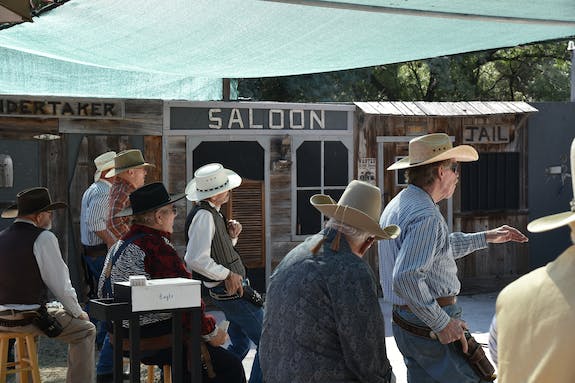
Tournaments are carried out in a “come to shoot” format, with shooters competing to be the first to hit their silver targets three times during seven rounds. Depending on the competition, round victors can be quickly crowned after just three shots; however, rounds that see 15 bullets fired by each competitor are not unheard of. Those who come up short are given an “x,” which is used to numerically rank shooters. After the opening seven rounds, participants with the fewest number of “x’s” are placed in a winner’s bracket that sees the top shooters squaring off to be named first place and the Outlaws’ fastest gun.
The gunfights take place during the third weekend of July at the club’s firing range, a backyard completely transformed into the American frontier by the club’s founders, the Gyorfy family. Handcrafted buildings draped in Old West signage that read “UNDERTAKER” or “EAGLE ROCK HOTEL” are reminiscent of something you might see in a Spaghetti Western, with the occasional tumbleweed adding to the ambiance.
Members craft aliases, which are substituted for their real names, and don 19th-century apparel while firing – spurs, cowboy hats, gun belts, stylized revolvers and holsters are all standard during the tournament — to build up the Wild West atmosphere. Try to call someone by their first name, and they won’t respond. Modern life is checked at the door.
Among those vying for the title of fastest gun is Advanced Test Reactor (ATR) nuclear operator Leslie Northrup, otherwise known as Lady Dynamite. As the daughter of a U.S. Fish and Wildlife Trapper, Northup spent many summers in her youth canvasing the Salmon and Big Lost Rivers while her father checked traplines meant to control predator populations – making shooting an instinctive aspect of her upbringing. Naturally, when she heard about the sport from a friend, Northup jumped at the opportunity to participate. “For me, it’s the friendship among the competitors,” she says. “We get to do something we all enjoy and get to know people we would never come in contact with otherwise. It’s a nice break from everyone’s daily lives.”
As one of the eight female nuclear operators in ATR’s utility area, Northrup monitors the overall activity of the complex by testing contingency systems to ensure they are operational and responsive. Monitoring the world’s leading nuclear test reactor requires attention to detail and patience – something she says has translated to quickdraw. “The learning of patience is a skill to be used in both the sport and at work,” she says. “To always give my best and accept when it ends up being a bit less than I would like it to be.”
The Outlaws are a proud affiliate of the Cowboy Fast Draw Association (CFDA), the largest quick draw organization in the world. CFDA is comprised of more than 70 clubs across the United States collectively housing over 5,000 registered members, with more enlisting year after year.
Though the different clubs are separated by name, every member practices the same guiding principles of “safety first, fun second and competition third” by using wax bullets and always wearing eye protection whenever on the range. “No one has fun if someone gets hurt,” Northup said. “My grandfather, a World War I veteran, always said, ‘you never point a gun at anything you don’t want to shoot.’ That’s the same in quick draw.”
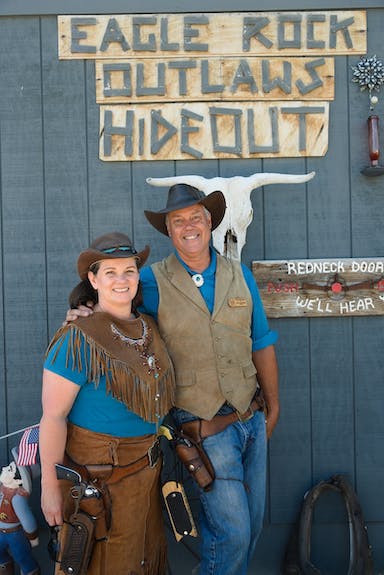
The club’s ethics are displayed profoundly by every member of the Outlaws according to Debbie Sioux’s husband The Bucknay Kidd, who is known off the line as William Walker. “It’s funny because in most sports, everyone is always looking to one up each other,” says William. “Whereas here, everyone is always telling you what you did right, and how you can improve so you can beat them.”
Debbie wasn’t always the seasoned gunslinger she is today. Several years ago, she climbed up to the firing line at her first major tournament in Caldwell, Idaho, with a hand that just couldn’t seem to relax. She stood nervously and stared her target down, but no matter how hard she tried, she couldn’t land a shot on it.
A hand judge took notice and did everything in her power to keep the gunslinger calm. “It doesn’t matter if you hit the target or not,” assures the judge. “What matters is that you look good doing it, and honey, you look good!” With a new-found boost in confidence, she relaxed and drew her gun with volant grace – hitting her mark and winning the round.
Before she became a member of CFDA 10 years ago, Debbie grew up in a Navy family that was constantly on the move, never living in the same place for longer than three years. She’s been to more cities than most people visit in their lifetimes. But with that came a sense of not belonging – something she found with the Outlaws. “It’s kind of like going to church,” the gunslinger says. “There have been times where CFDA members have fallen on hard times, and (we’ve) been there to help pick them up. We are all out here to have fun and encourage each other to do our best.”
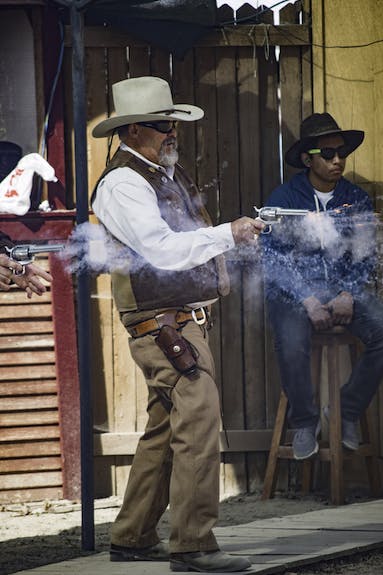
The sense of community and family is felt among the 70 different CFDA clubs in the nation. In fact, the entire organization came to the aid of a member’s granddaughter suffering from cancer by coming together to help pay for medical treatment. More recently, two shooters lost their homes last year in California’s deadly Camp Fire, and yet again, CFDA garnered funds to help get them back on their feet. Everyone is family, even if they don’t know each other.
Competing alongside Lady Dynamite and Debbie Sioux is Eddy Walters, a quick draw veteran known as Half Fast Eddy among competitors. Walters has worked at the Site for the last 32 years. Though his time at the lab dates back to serving as a laborer in 1976, his full-time career began in 1987 as a security officer, which has opened many different avenues of growth in Walters’ career. Today, he serves as a crucial component in the verification of waste disposal as an independent technical review expert for the Idaho Cleanup Project for North Wind, Inc.
Walters’ experience has led him to employment at many different facilities on the INL Site, including the Advanced Mixed Waste Treatment Project (AMWTP) where he was introduced to quick draw by Debbie. He was hesitant to give the sport a try at first, but after constant pestering by his former colleague, he gave into temptation, picked up his gun, and for the past four years, hasn’t put it down. “In my mind, it’s a competition with yourself,” says Walters. “You’re always trying to beat your previous time. Plus, who doesn’t like to dress up like their favorite Western hero?”
Since she started competing a decade ago, Debbie has participated in tournaments across Oregon, Nebraska, Colorado and even placed second at the Four Corners Territorial Championships. Needless to say, Debbie has a quick hand, something she’s tried to pass onto her family. Aside from her husband-in-arms, The Bucknay Kidd, who she married on the firing line at the National Championship in 2017, Debbie’s father and daughter all compete regularly as members of CFDA. Her gunslinging ability has had a positive effect on her grandson Ryker, who placed first in the Gunfights’ youth category under the alias Quick Freeze.
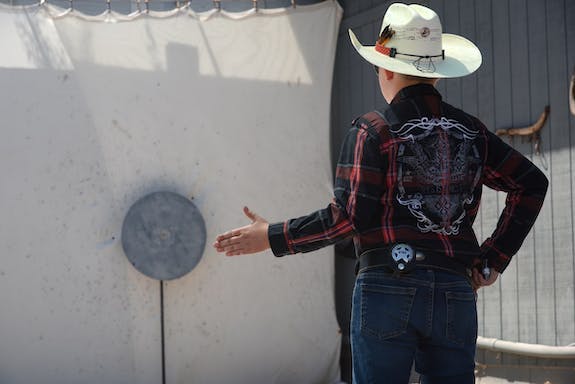
When she isn’t competing alongside her family, Debbie works as a quality assurance inspector at the Specific Manufacturing Capability, manufacturer of armor packages for the U.S. Army’s Abrams battle tank. Though she’s had variety of titles at INL, being able to support U.S. soldiers around the world at SMC is something she takes great pride in. “Much like the people at SMC, the CFDA is a very patriotic group and are very proud and thankful of our military and veterans,” Debbie says enthusiastically. “That’s one of the main reasons I’m so proud to be a member of both.”
The Outlaws are constantly looking for more shooters to join their ranks and welcome new members with open arms. Those interested in quick draw are encouraged to check out the Eagle Rock Outlaws Facebook page to see how they can attend the club’s monthly practice and competition to test their gunslinging ability.
Hobbies are fulfilling, and fulfilled people make more productive employees. Hobbies unearth hidden skills, alleviate stress, unite you with others, and improve quality of life — all things that will help you function better at work. See other stories about Idaho National Lab employees.

